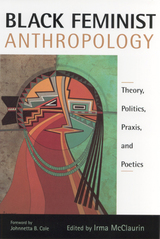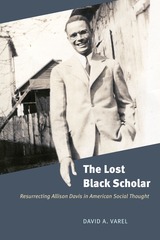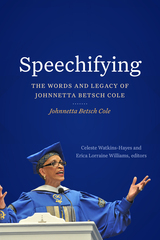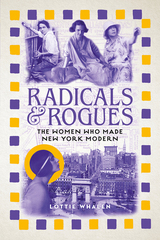4 books about African American anthropologists

African-American Pioneers in Anthropology
Edited by Ira E. Harrison and Faye V. Harrison
University of Illinois Press, 1999
This pathbreaking collection of intellectual biographies is the first to probe the careers of thirteen early African American anthropologists, detailing both their achievements and their struggle with the latent and sometimes blatant racism of the times. Invaluable to historians of anthropology, this collection will also be useful to readers interested in Black studies and biography. Includes entries on: Caroline Bond Day, Zora Neale Hurston, Louis Eugene King, Laurence Foster, W. Montague, Cobb, Katherine Dunham, Ellen Irene Diggs, Allison Davis, St. Clair Drake, Arthur Huff Fauset, William S. Willis Jr., Hubert Barnes Ross, Elliot Skinner.
[more]

Black Feminist Anthropology
Theory, Politics, Praxis, and Poetics
McClaurin, Irma
Rutgers University Press, 2001
In the discipline's early days, anthropologists by definition were assumed to be white and male. Women and black scholars were relegated to the field's periphery. From this marginal place, white feminist anthropologists have successfully carved out an acknowledged intellectual space, identified as feminist anthropology. Unfortunately, the works of black and non-western feminist anthropologists are rarely cited, and they have yet to be respected as significant shapers of the direction and transformation of feminist anthropology.
In this volume, Irma McClaurin has collected-for the first time-essays that explore the role and contributions of black feminist anthropologists. She has asked her contributors to disclose how their experiences as black women have influenced their anthropological practice in Africa, the Caribbean, and the United States, and how anthropology has influenced their development as black feminists. Every chapter is a unique journey that enables the reader to see how scholars are made. The writers present material from their own fieldwork to demonstrate how these experiences were shaped by their identities. Finally, each essay suggests how the author's field experiences have influenced the theoretical and methodological choices she has made throughout her career.
Not since Diane Wolf's Feminist Dilemmas in the Field or Hortense Powdermaker's Stranger and Friend have we had such a breadth of women anthropologists discussing the critical (and personal) issues that emerge when doing ethnographic research.
In this volume, Irma McClaurin has collected-for the first time-essays that explore the role and contributions of black feminist anthropologists. She has asked her contributors to disclose how their experiences as black women have influenced their anthropological practice in Africa, the Caribbean, and the United States, and how anthropology has influenced their development as black feminists. Every chapter is a unique journey that enables the reader to see how scholars are made. The writers present material from their own fieldwork to demonstrate how these experiences were shaped by their identities. Finally, each essay suggests how the author's field experiences have influenced the theoretical and methodological choices she has made throughout her career.
Not since Diane Wolf's Feminist Dilemmas in the Field or Hortense Powdermaker's Stranger and Friend have we had such a breadth of women anthropologists discussing the critical (and personal) issues that emerge when doing ethnographic research.
[more]

The Lost Black Scholar
Resurrecting Allison Davis in American Social Thought
David A. Varel
University of Chicago Press, 2018
Allison Davis (1902–83), a preeminent black scholar and social science pioneer, is perhaps best known for his groundbreaking investigations into inequality, Jim Crow America, and the cultural biases of intelligence testing. Davis, one of America’s first black anthropologists and the first tenured African American professor at a predominantly white university, produced work that had tangible and lasting effects on public policy, including contributions to Brown v. Board of Education, the federal Head Start program, and school testing practices. Yet Davis remains largely absent from the historical record. For someone who generated such an extensive body of work this marginalization is particularly surprising. But it is also revelatory.
In The Lost Black Scholar, David A. Varel tells Davis’s compelling story, showing how a combination of institutional racism, disciplinary eclecticism, and iconoclastic thinking effectively sidelined him as an intellectual. A close look at Davis’s career sheds light not only on the racial politics of the academy but also the costs of being an innovator outside of the mainstream. Equally important, Varel argues that Davis exemplifies how black scholars led the way in advancing American social thought. Even though he was rarely acknowledged for it, Davis refuted scientific racism and laid bare the environmental roots of human difference more deftly than most of his white peers, by pushing social science in bold new directions. Varel shows how Davis effectively helped to lay the groundwork for the civil rights movement.
In The Lost Black Scholar, David A. Varel tells Davis’s compelling story, showing how a combination of institutional racism, disciplinary eclecticism, and iconoclastic thinking effectively sidelined him as an intellectual. A close look at Davis’s career sheds light not only on the racial politics of the academy but also the costs of being an innovator outside of the mainstream. Equally important, Varel argues that Davis exemplifies how black scholars led the way in advancing American social thought. Even though he was rarely acknowledged for it, Davis refuted scientific racism and laid bare the environmental roots of human difference more deftly than most of his white peers, by pushing social science in bold new directions. Varel shows how Davis effectively helped to lay the groundwork for the civil rights movement.
[more]

Speechifying
The Words and Legacy of Johnnetta Betsch Cole
Johnnetta Betsch Cole. Celeste Watkins-Hayes and Erica Lorraine Williams, editors
Duke University Press, 2023
Speechifying collects the most important speeches of Dr. Johnnetta Betsch Cole—noted Black feminist anthropologist, the first Black female president of Spelman College, former director of the Smithsonian Institution's National Museum of African Art, and former chair and president of the National Council of Negro Women. A powerful and eloquent orator, Dr. Cole demonstrates her commitment to the success of historically Black colleges and universities, her ideas about the central importance of diversity and inclusion in higher education, the impact of growing up in the segregated South on her life and activism, and her belief in public service. Drawing on a range of Black thinkers, writers, and artists as well as biblical scripture and spirituals, her speeches give voice to the most urgent and polarizing issues of our time while inspiring transformational leadership and change. Speechifying also includes interviews with Dr. Cole that highlight her perspective as a Black feminist, her dedication to public speaking and “speechifying” in the tradition of the Black church, and the impact that her leadership and mentorship have had on generations of Black feminist scholars.
[more]
READERS
Browse our collection.
PUBLISHERS
See BiblioVault's publisher services.
STUDENT SERVICES
Files for college accessibility offices.
UChicago Accessibility Resources
home | accessibility | search | about | contact us
BiblioVault ® 2001 - 2024
The University of Chicago Press









